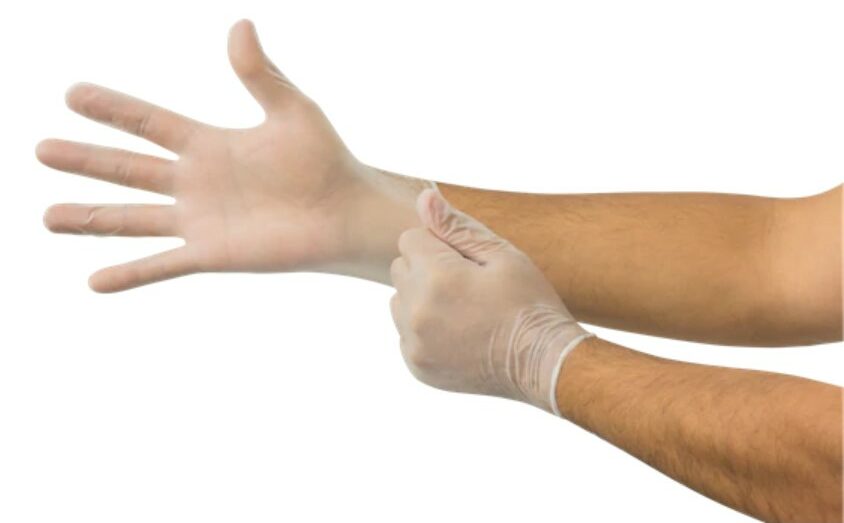Vinyl gloves were the favorites before the arrival of nitrile gloves since they were the cheapest alternative for people who had a latex allergy. Then, the FDA started raising concerns about the use of vinyl gloves in the healthcare sector.
This guide, however, isn’t about which of the two gloves, vinyl or nitrile, is better. Instead, it will shed light on many qualities (even cons) of vinyl gloves.
People often wonder if vinyl gloves are oil-resistant and the answer is yes. Yes, vinyl gloves are resistant to oil. They’re also resistant to grease, mild acids, water, and fats.

If you want to find out where vinyl gloves can be used and what are their types, then this guide is a goldmine of answers. Dive in for all details!
What are vinyl gloves exactly made of?
Vinyl gloves are made of plasticizers, PVC, and polymers. They’re not of the same constituents as nitrile gloves, even though nitrile gloves are also made-made.
We will discuss the basic differences between vinyl and nitrile gloves, but that’s for a later section in this guide.
Cutting back to the chase, vinyl gloves aren’t disposable because of their constituents since one of them is plastic. This is one reason that people have started having concerns about using vinyl gloves as they’re a possible-probable threat to the environment.
What are the properties of vinyl gloves: are they oil-resistant?
Vinyl gloves have had many properties that have contributed to their popularity as well as their doom.
One of the better qualities of vinyl gloves is that they are resistant to oil, fat, and grease. That’s why they can be easily used in low-risk jobs where you’ve got to protect your hands from grease.
Unless they’re from a batch that’s years and years old, oil cannot break the surface of vinyl gloves. They usually have a shelf-life of five years.
Types of vinyl gloves
Vinyl gloves are basically of two types:
-
-
- Powdered vinyl gloves
- Powder-free vinyl gloves.
-
Although both types have poly-vinyl chloride (PVC), the difference between them is that the powdered ones have cornstarch and the powder-free ones don’t.
The powdered vinyl gloves aren’t safe when handling food or for people who have very sensitive skin. On the other hand, non-powdered vinyl gloves have a lower risk. (What Is the Difference Between Powdered and Non Powdered Gloves?)
Despite this, it’s not recommended to use vinyl gloves as examination gloves or cooking gloves. They should be used for very low-risk jobs (to be explained later).
4 Advantages of vinyl gloves
Vinyl gloves ruled all industries for decades. Naturally, they had their own sets of advantages that made them last as favorites for so long and despite the developments, they are still used by many people.
Here we have discussed the top four advantages of using Vinyl gloves. Have a look!
#1. They’re resistant to oil and fats
Did you know that the surface of vinyl gloves has a petroleum-based coating? Hence, they resist oil to a very large extent.
You can easily wear them for four hours straight and they will protect your hands from fat and grease alongside protecting them from oil.
Their resistance to oil also offers a good grip. Hence, you’ll find it easier to hold your tools.
#2. They’re waterproof
This is another reason why they offer a good grip even in wet greasy conditions. They will protect your hands.
#3. They’re cheaper latex-free alternatives
The biggest problem with rubber gloves is that they contain latex that can cause type 4 skin diseases, eczema, and allergies.
Although nitrile gloves are more durable and stronger alternatives for people with latex allergies, they’re expensive too. On the other hand, vinyl gloves don’t cause latex allergy and they’re cheaper.
#4. They’re easier to wear and remove
Vinyl gloves are very smooth; especially, powdered vinyl gloves. It makes it very easy to slip the gloves on and off.
But as you know by now, cornstarch in powdered vinyl gloves can cause allergies. That’s why there’s a powder-free version too. It also offers the ease to glide the gloves on and off.
Cons of using vinyl gloves
The very fact that FDA warns against using vinyl gloves in high-risk jobs establishes the fact that there are some serious concerns that these gloves have raised.
Have a look at three such situations that you should be aware of so that you aren’t misinformed in any way.
#1. Vinyl gloves contain phthalates
Did you know that phthalates are carcinogenic? And powdered vinyl gloves have 4 different kinds of carcinogens.
That’s the reason that you should try and use powder-free vinyl gloves if you have to absolutely use them.
#2. Vinyl gloves will not offer protection from very strong acids
Do not ever wear vinyl gloves when handling concentrated acids or ketogenic solutions. The surface of vinyl will quickly dissolve and the gloves will melt in no time, leaving your hands unprotected.
Yes, these gloves are impermeable, but they’re impermeable to oil and water, and that too for some hours. So, don’t push your luck and use the gloves keeping their limits in your mind.
#3. Vinyl gloves are a threat to the environment
Not only do they have the power to harm your health but they also have equal power to disturb the ecosystem. You ask us Why? Well, you can’t decompose vinyl gloves. They’re non-biodegradable.
Myths and facts about Vinyl gloves
Ever since nitrile gloves have come into existence, a lot of rumors have started revolving around vinyl gloves. Some of those rumors are facts and some are absolute myths.
We’ve segregated myths from facts in the following sections. Have a look!
1. Vinyl gloves do not protect against blood-borne pathogens – it’s a fact
Many people ask this question – Do vinyl gloves protect against bloodborne pathogens? The answer is no.
Vinyl gloves aren’t suitable in such cases. In fact, using them when there’s a high viral load isn’t recommended either.
Did you know that it was in 1961 that it was first discovered that vinyl gloves weren’t sufficient protection against HIV?
2. Vinyl gloves can decompose – it’s a myth
Here’s another question that’s mostly asked: Do vinyl gloves decompose? Let’s find out the truth.
People think that vinyl gloves can decompose after 5 years. But that’s not the case. 5 years is their shelf life. You have to be very careful when you’re trying to get rid of vinyl gloves.
3. Vinyl and latex are different: it’s a fact
One of the questions that confuse people is: is vinyl the same as latex? And, the answer is no
Both are different. In fact, vinyl gloves are an alternative to rubber gloves that contain latex.
Industries where you can use vinyl gloves?
Vinyl gloves can be used in low-risk environments and jobs. You can use them:
-
-
- If you are a sanitation worker.
- If you are a waste disposal worker.
- If you are cleaning your house.
- To perform non-aseptic purposes.
- For painting jobs.
-
Nitrile Vs Vinyl Gloves
Now comes the section where we’re holding the elephant in the room by its tail: which one is better, vinyl or nitrile?
A quick comparison between the two might help you choose what’s best for you.
1.) Both Nitrile gloves and vinyl gloves are suitable for people who have a latex allergy. But, nitrile gloves are expensive. Hence, a lot of people still prefer using vinyl gloves as a substitute for gloves that contain latex.
2.) Nitrile gloves offer better protection against acids and viruses than vinyl gloves. Besides, nitrile gloves don’t have phthalates either. Hence, they’re better options for the medical industry and food preparation industry.
3.) For loading and unloading items like packaged goods, vinyl gloves are more cost-effective.
4.) Although vinyl gloves are cheaper, they’re not as durable and strong as nitrile gloves.
Most importantly, the FDA suggests using nitrile gloves over vinyl gloves for medical procedures and cooking food.
So, which of the two you use depends upon what your job is, how much risk is involved, and for how long you have to wear them continuously.
FAQs
1. Are Vinyl gloves impermeable?
Vinyl gloves are impermeable to water and they’re highly resistant to oil and grease.
You can safely use them for 4 hours. However, they’re not as strong as nitrile gloves. So, stretching your fingers far apart or tugging on the gloves can bring apart the molecules.
2. What do vinyl gloves protect against?
They can protect your hands from mild acids, water, grease, oil, and fats.
3. Are Vinyl gloves safe?
Talking in medical terms, no. They’re not safe for performing surgeries. You have to make sure you’re wearing them when there’s a very low risk of contamination.
4. Can Vinyl gloves be used for personal care?
As long as personal care doesn’t involve the gloves getting in touch with blood, they can be safe. Don’t use them while cooking food. But you can wear them while dusting and cleaning.
Concluding Thoughts
Vinyl gloves are resistant to oil and fats, and, at the same time, they’re waterproof too. As long as you follow the safety rules laid for vinyl gloves (not using them to prepare food and perform surgeries, not using them when handling ketonic solutions), they will offer protection.
However, you have to know that vinyl gloves are not environmentally friendly. This is why disposing of them properly is very necessary.
In a nutshell, we hope you have all the answers about the properties of vinyl gloves now and you will be able to decide whether or not you want to use them.







